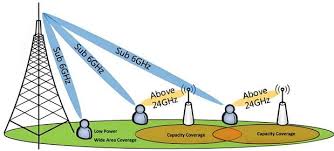What Is 5G Internet? Benefits, Speed, and Future Impact
telcomatraining.com – The digital world is evolving rapidly, and one of the most significant advancements in recent years is the introduction of 5G internet. As the fifth generation of mobile networks, 5G promises to transform how we connect, communicate, and use technology in our daily lives. But what exactly is 5G, how fast is it, and what could it mean for the future?
What Is 5G Internet?
5G stands for “fifth-generation mobile network.” It is the latest standard for wireless communication, succeeding 4G LTE. While previous generations focused on improving mobile phone connectivity, 5G takes a broader approach by offering ultra-fast data speeds, low latency, and massive network capacity. This makes it suitable not just for smartphones, but also for IoT devices, smart cities, autonomous vehicles, and more.
Unlike earlier generations, 5G uses a wider range of frequency bands, including millimeter waves (mmWave) that allow for significantly faster data transmission. These high-frequency waves provide more bandwidth, enabling more devices to connect simultaneously without lag or interruptions.
Key Benefits of 5G Internet
- Faster Speeds One of the biggest selling points of 5G is its lightning-fast speeds. With theoretical download speeds of up to 10 Gbps, 5G is up to 100 times faster than 4G. This means you can download movies, stream 4K videos, or play online games with virtually no delay.
- Ultra-Low Latency Latency refers to the time it takes for data to travel from one point to another. 5G offers latency as low as 1 millisecond, which is ideal for applications that require real-time responsiveness, such as remote surgery, autonomous driving, and cloud gaming.
- Greater Device Capacity 5G networks can support up to 1 million devices per square kilometer, compared to just 100,000 for 4G. This is essential for densely populated areas and the growing number of connected devices in smart homes and cities.
- Improved Reliability 5G offers a more stable connection, even in crowded environments like stadiums or concerts. This reliability ensures uninterrupted service, which is crucial for both consumers and industries relying on consistent connectivity.
How Fast Is 5G Compared to 4G?
In practical terms, 5G is significantly faster than 4G. While average 4G speeds range from 20–100 Mbps, 5G users often experience speeds between 300 Mbps and 1 Gbps, depending on location and network conditions. In ideal settings, 5G can even reach speeds over 10 Gbps, making it possible to download a full HD movie in just a few seconds.
The Future Impact of 5G Internet
The true potential of 5G lies in how it will reshape industries and drive innovation across multiple sectors:
- Healthcare: With high-speed and low-latency connections, 5G enables remote diagnostics, telemedicine, and even robot-assisted surgeries in real time.
- Automotive: 5G is a crucial part of developing self-driving cars, which require instant communication with sensors, traffic systems, and other vehicles.
- Manufacturing: In smart factories, 5G can connect thousands of machines, streamlining operations and boosting productivity through automation and AI.
- Entertainment & Media: From virtual reality (VR) to augmented reality (AR) experiences, 5G opens the door to immersive content with seamless delivery.
Conclusion
5G internet is not just an upgrade—it’s a technological revolution. With its unmatched speed, ultra-low latency, and ability to handle massive data loads, 5G is paving the way for a smarter, more connected future. As more cities and countries adopt this new standard, the full impact of 5G will continue to unfold, transforming how we live, work, and interact with the digital world.







